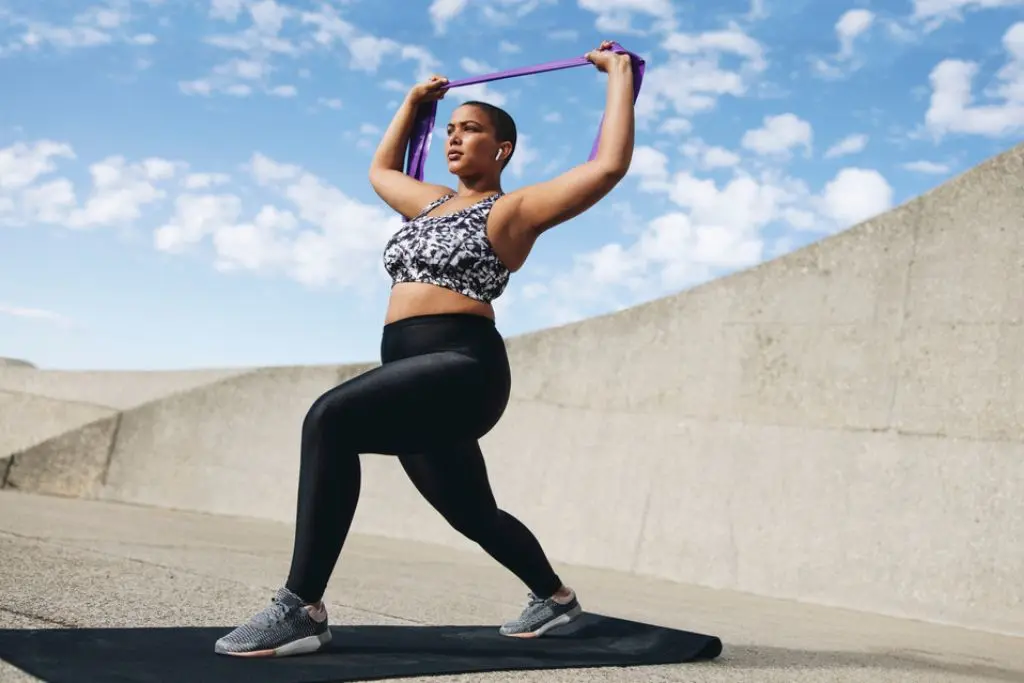Numbers Can Be Deceptive: 4 Reasons To Rethink The Scales

August 4, 2022 - Updated August 4, 2022

We can harp on for days about all the amazing reasons to nourish and move your body that have nothing to do with your weight or how you look, but we also get it - for many women, losing weight or changing your body shape or composition is a goal.
On any health and fitness journey, hopping on the scales regularly can seem like a good way to measure your progress and stay motivated. But is it? Nope, not always!
Sweat Trainer Kelsey Wells doesn’t weigh herself and is a big fan of saying “screw the scales”, preferring to measure her progress by things that truly matter to her - strength, ability, endurance, health and happiness.
Let’s break it down with four reasons why you may want to rethink the scales, and some alternative options.
1. Your weight can fluctuate daily
When the number on your scales moves up or down, it often doesn’t have anything to do with your body shape, size or health.
Many things can cause weight changes, such as how hydrated you are, your salt intake, when you last went to the bathroom, your stress and hormone levels, which stage of your menstrual cycle you’re in, and illness - just to name a few.
To base your ideas of “success” or “progress” on a number that can be affected by such a wide variety of changing factors isn’t always the best idea!

2. The scales don’t always reflect changes in body composition
If you’re following a strength training program, it’s also common to experience quite a significant change in body composition or shape without seeing any changes on the scales, due to the fact you may be gaining lean muscle tissue while losing fat tissue.
On the flip side, weight loss on the scales can also be due to loss of muscle mass, which isn’t a healthy goal either.
A typical set of scales simply reflects the relationship between your body and gravity. It doesn’t say anything about what your body is made up of. This not only includes fat and muscle tissue, but also your bones, organs and fluids.
Changes in body composition also happen very slowly, so if you’ve seen a sudden jump, it’s probably due to something else. And if you’re losing weight rapidly, it’s important to see your healthcare professional. For safe weight loss, Mayo Clinic recommends 0.5 - 1 kg per week.
3. The number on the scales doesn’t say anything about your overall health
So you know how much your body weighs, but does that give you the whole picture when it comes to your health? Of course not!
As you start to implement healthy habits and get fitter and stronger, your heart will start to pump blood more efficiently, and you may see improvements in your resting heart rate, blood pressure, digestion, sleep, VO2 max, energy levels, stress and mood.
The number on the scales also doesn’t reflect your hormonal health, the regularity of your menstrual cycle, your vitamin and mineral levels, your cholesterol, or how strong you are.
You could feel the best you’ve ever felt, but none of this will show on the scales.

4. It can negatively impact your mood and motivation, even if you’re making progress!
If the main way you’re measuring your progress and staying motivated on your health and fitness journey is the number on the scales, you may be setting yourself up for a very bumpy emotional ride.
Feeling deflated because the number isn’t changing (or if it has gone up), even though you’ve been nailing your workouts and nutrition? You could still be making amazing progress, gaining lean muscle, or simply had more water retention, stress, or fluctuating hormones.
Likewise, you could see a change on the scales that you think is worth celebrating, when in reality your excitement is due to an empty bowel or bladder!
One 2016 research review investigated the relationship between self-weighing and psychological wellbeing, and although there were mixed findings, one study did observe increases in anxiety and depression for the weighing group compared to the non-weighing group.
Everyone is different, so decide what works best for YOU. If the scales are messing with your mood or motivation, maybe it’s time to try something new.

What can you do instead?
As a starting point, it can help to ask yourself a few questions. Here are some ideas to get the ball rolling:
Why am I weighing myself?
Is it necessary for my unique health and fitness goals?
What does success on this journey mean to ME?
Are there better ways I could measure my progress?
Other tests and measurements
If seeing a difference in your body shape is a goal for you, consider taking photos or measurements instead. If you’re doing a muscle building program and are looking to gain lean muscle, keep in mind some measurements might increase (like the size of your biceps!). You could also book yourself in for a body composition test at the start and end of your workout program to see those muscle gains!
How often should you weigh yourself?
Sometimes, the scales can be a helpful tool. Just remember that weighing yourself once a week or fortnight is plenty and it’s best to do it in the morning after you wake up, wearing the same clothes (or no clothes), and using the same set of scales. Daily weight checks definitely aren’t necessary or recommended due to all of those body fluctuations.

Create new goals
Perhaps you’ve decided the scales aren’t that helpful for you, but you’re not sure what would motivate you instead. This is an exciting time to make some new goals, woohoo!
Aside from seeing physical changes, here are some great ideas that have nothing to do with the scales or how you look:
Complete a certain number of workouts each week
Stay hydrated by drinking a certain amount of water each day
Master a new exercise or a more challenging variation. Perhaps you want to complete push-ups on your toes, learn how to deadlift, or perform a box jump for the first time!
Lift heavier weights - picking a target can be super motivating
Complete a Sweat program from start to finish
Eat more fruit and vegetables each day
Start a gratitude journal to help you keep track of all the things you’re grateful to your body for
If you’ve been hitting 7,000 steps a day, maybe you want to try for 8,000!
Run a certain distance without stopping
Try to create SMART goals for yourself, meaning they are specific, measurable, achievable, realistic and timebound. Brand new goals can also be like rocket fuel for your motivation and enthusiasm.
Remember how powerful you are
Whether you weigh yourself regularly or not, don’t let the scales make or break your day. Remember what that number represents - your organs, bones, muscle and fat tissue, food, skin and fluids. It says nothing about your health, your inner strength, your fitness, or who you are as a person.

A more empowered you starts with Sweat, and our editorial team is here to bring you the latest fitness tips, trainer recommendations, wellbeing news, nutritional advice, nourishing recipes and free workouts.
* Disclaimer: This blog post is not intended to replace the advice of a medical professional. The above information should not be used to diagnose, treat, or prevent any disease or medical condition. Please consult your doctor before making any changes to your diet, sleep methods, daily activity, or fitness routine. Sweat assumes no responsibility for any personal injury or damage sustained by any recommendations, opinions, or advice given in this article.
Wellbeing